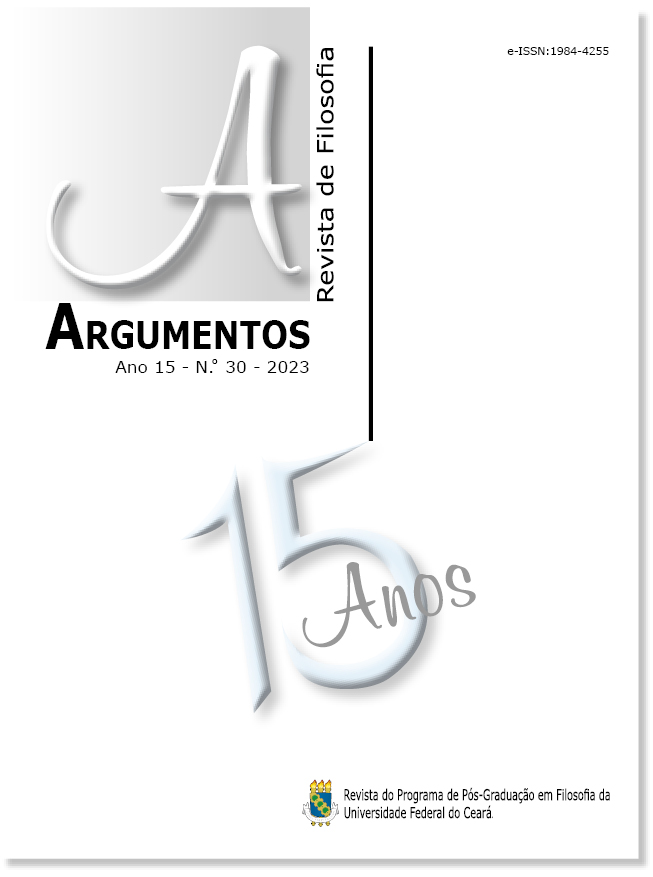Two finitudes: Heidegger and Karl Jaspers’ reception by the Weilian category of the finite
DOI:
https://doi.org/10.36517/10.36517/Argumentos.30.3Keywords:
Finite. Eric Weil. Jaspers. Heidegger. Nazism.Abstract
Eric Weil, Karl Jaspers and Martin Heidegger are three German philosophers, one of whom is Jewish. Weil presents in the category of the finite a possibility among the philosophical discourses that comprise Heidegger and Jaspers. This paper proposes a partial understanding of Jaspers and Heidegger through the Weilian category of the finite and the resumption operated by this possibility of discourse – finitude – of the category of work, whose phenomenology is Nazism. For this purpose, the article was divided into three sections, followed by an introduction. The Introduction aims to present the relationship between the three thinkers given through two texts by Weil. We also list the reasons for choosing the works of Heidegger and Jaspers that will be discussed. The first section of the article contains a presentation of the Weilian concepts that are the basis for the following sections. In the second section, these concepts are compared with the Heideggerian thought. In the third section, we apply the same method to Jaspers' thinking, showing the limitations that Heidegger's thinking finds on the political plane. We conclude the paper with a small balance of the discussion.
References
CANIVEZ, P. Le politique et as logique dans l’oeuvre d’Eric Weil. Paris: Editions Kimé, 1993.
CANIVEZ, P. Weil. Paris: Société d’édition les Belles Lettres, 1999.
GANTY, E. Penser la modernité. Essai sur Heidegger, Habermas e Eric Weil. Namur: Presses Universitaires de Namur, 1997.
HEIDEGGER, M. Origem da obra de arte. Lisboa: Edições 70, 2004.
HEIDEGGER, M. Que é isto – A filosofia? Em: Que é isto – A filosofia: identidade e diferença. Petrópolis: Vozes, 2009.
JASPERS, K. A questão da culpa: a Alemanha e o nazismo. Tradução de Cláudia Dornbusch. São Paulo: Todavia, 2018.
JASPERS, K. A situação espiritual do nosso tempo. Tradução de João Modesto. Lisboa: Moraes Editora, 1968.
JASPERS, K. Die Schuldfrage. Heidelberg: Lambert Schneider, 1946.
KIRSCHER, G. Absolu et sens. Archives de Philosophie, n° 33, p. 373-400. Paris: Beauchesne, 1970.
KIRSCHER, G. Eric Weil ou la raison de la philosophie. Paris: Presses Universitaires du Septentrion, 1999.
KIRSCHER, G. Figures de la violence et de la modernité: Essais sur la philosophie d’Eric Weil. Lille: Presses Universitaires de Lille, 1992.
KIRSCHER, G. La philosophie d’Eric Weil. Paris: Presses Universitaires de France, 1989.
PERINE, M. Filosofia e violência: sentido e intenção da filosofia de Éric Weil. São Paulo: Edições Loyola, 1987.
QUILLIEN, J. Discours et langage ou ‘Logique de la philosophie’. Archives de Philosophie, n° 33, p. 401-438. Paris: Beauchesne, 1970.
RICOEUR, P. Leituras 1: em torno ao politico. Tradução de Marcelo Perine. São Paulo: Edições Loyola, 1995.
SAVADOGO, Mahamadé. Éric Weil et l’achèvement de la philosophie das l’Action. Namur: Presses universitaires de Namur, 2003.
TEIXEIRA, E. M. Introdução. Em: PLATÃO. A República. Tradução de Eleazar Magalhães Teixeira. Fortaleza: Edições UFC, 2009.
WEIL, E. Filosofia política. São Paulo: Edições Loyola, 2011.
WEIL, E. Le cas Heidegger. Em: Philosophie et réalité II. Paris: Beauchesne, 2003.
WEIL, E. Lógica da filosofia. São Paulo: É Realizações, 2012.
WEIL, E. O caso Heidegger. Argumentos Revista de filosofia UFC. Fortaleza, ano 12, n. 23, p. 126-137, jan./jun. 2020.
Downloads
Published
Issue
Section
License
Argumentos magazine is licensed under an International Creative Commons Attribution License.
The Magazine uses CC BY inclusion
1) The authors retain the copyright granted to the magazine or the right to initial publication, with the work regularly licensed under the Creative Commons Attribution, which allows the sharing of the work with acknowledgment of authorship and initial publication in this magazine.
2) The authors are authorized to contract additional applicable contracts, for non-exclusive distribution of the version of the work published in this journal (for example, publication in the institutional repository or as a chapter of the book), recognition of authorship and initial publication in this journal.
3) Authors are authorized and encourage to publish and distribute their work online (for example, in institutional repositories or on their personal pages) at any time before or during the editorial process, as they can generate productive changes, as well as increase the impact and reference of published work.




.jpg)










._._3.png)
1.jpg)
._._._.png)
